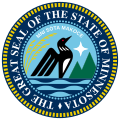| |||||||||||||||||
| |||||||||||||||||
| |||||||||||||||||
| Elections in Minnesota |
|---|
 |
The 1898 Minnesota lieutenant gubernatorial election was held on November 8, 1898, in order to elect the Lieutenant Governor of Minnesota. Republican nominee Lyndon A. Smith defeated Democratic-People's nominee and candidate for Lieutenant Governor in the 1896 election James Madison Bowler, Prohibition nominee Addison H. Gilmore and Midroad Populist nominee and former member of the United States House of Representatives from Minnesota's 5th district Kittel Halvorson. [1]

